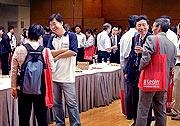Sharing the challenges with Asia
UNSW has launched a major research collaboration in Asia, recognising the challenges Australia now shares with an increasingly industrialised and developed Asian region.
UNSW has launched a major research collaboration in Asia, recognising the challenges Australia now shares with an increasingly industrialised and developed Asian region.

UNSW has launched a major research collaboration in Asia, recognising the challenges Australia now shares with an increasingly industrialised and developed Asian region.
The University has appointed 85 Visiting Research Fellows from Asia's leading universities at the first UNSW international research workshop, which brought together world class academics on the Kensington campus. The Fellowships formalise regional research ties in the key areas of science, engineering and medicine, emulating the academic relationships which have long linked Western universities.
UNSW Dean of Medicine, Professor Peter Smith, said the rapidly rising standard of living in Asia meant health issues such as malnutrition were being replaced by challenges familiar to Western societies, such as ageing populations, cancer, new infectious diseases and obesity related complaints.
"Increasingly, we are seeing shared problems in health developing in our region. This is a fantastic opportunity for us to collaborate to address these challenges," Professor Smith said.
At the same time, industrialisation and growing consumer incomes are putting acute pressure on Asia's environment, prompting keen interest in UNSW's world class competency in renewable energy technologies, waste water management and sustainability.
"We know that dealing with environmental problems by pushing dirty industries into developing countries won't work - we all have to clean up in a global village," said one of the new Research Fellows, Dr Priyangshu Manab Sarma, of India's Energy and Resouce Institute (TERI).
"National based solutions aren't good enough," he said of India's growing problems of air and water pollution and energy shortfalls.
"We have to share knowledge across national borders. This type of research collaboration is very positive."
The new international cohort from China, India, Indonesia, Japan, Malaysia, Singapore, South Korea, Taiwan, Thailand and Vietnam bring with them world class expertise in areas such as cancer research, HIV, immunology, nanotechnology, sustainable engineering processes, renewable energy and information technology.
The 45 leading Asian universities represented in the new fellowships will have access to cutting edge expertise at UNSW. New collaborative research clusters will be established to share knowledge, greatly boosting UNSW's presence in the Asia region and facilitating exchanges between outstanding academics and students.